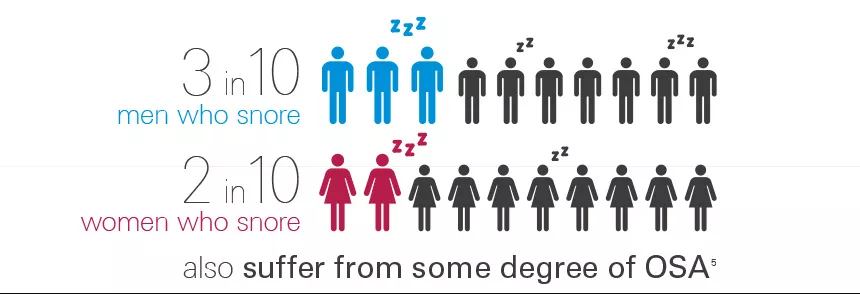Key Facts About Snoring
From ResMed.com – Original Article on Snoring
Loud snoring disrupts sleep for you and your partner. It’s also a sign you may have obstructive sleep apnea. Get the facts.
If you snore – especially if you snore loudly – you know how disruptive it can be. You disturb your neighbours when you fall asleep on airplanes or in theatres. Your bed partner complains they can’t sleep and banishes you to the spare room or the sofa. In fact, 95% of snorers say that their snoring bothers their partner.
 And it plays havoc with your sleep as well, whether you realize it or not. Snoring means you may not get the amount of oxygen you need for a healthy night’s sleep. And you know what happens when you don’t sleep well: you’re tired, listless, even grumpy.
And it plays havoc with your sleep as well, whether you realize it or not. Snoring means you may not get the amount of oxygen you need for a healthy night’s sleep. And you know what happens when you don’t sleep well: you’re tired, listless, even grumpy.
Loud, bothersome snoring can have other, less obvious side effects, too. Snorers are 1.6 times more likely to develop high blood pressure within 4 years of beginning to snore. There are risks of other cardiovascular diseases as well.
Not all snorers have OSA, but almost everyone who has OSA… snores
 If this wasn’t bad enough, snoring is also the primary indicator of obstructive sleep apnea (OSA), which is the most common form of sleep apnea. Snoring and sleep apnea are linked at an alarming rate — 3 in 10 men and nearly 2 in 10 women who are habitual snorers also suffer from some degree of obstructive sleep apnea. Sleep apnea prevents you from getting the healthy sleep you need to lead a refreshed, energetic life.
If this wasn’t bad enough, snoring is also the primary indicator of obstructive sleep apnea (OSA), which is the most common form of sleep apnea. Snoring and sleep apnea are linked at an alarming rate — 3 in 10 men and nearly 2 in 10 women who are habitual snorers also suffer from some degree of obstructive sleep apnea. Sleep apnea prevents you from getting the healthy sleep you need to lead a refreshed, energetic life.
Clinical studies show that people with untreated sleep apnea run greater health risks:
 So if you snore, or suspect you snore, consider it a sign that something might not be right. Take our short sleep apnea quiz or contact us to find a sleep testing facility near you.
So if you snore, or suspect you snore, consider it a sign that something might not be right. Take our short sleep apnea quiz or contact us to find a sleep testing facility near you.
Remember: Snoring can’t be cured, but it can be controlled. An oral appliance like ResMed’s Narval CC™* successfully stops loud snoring in almost 9 of 10 people who use it.





